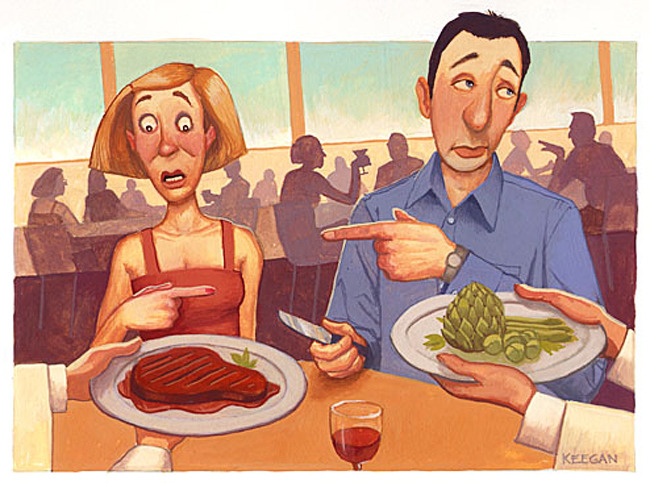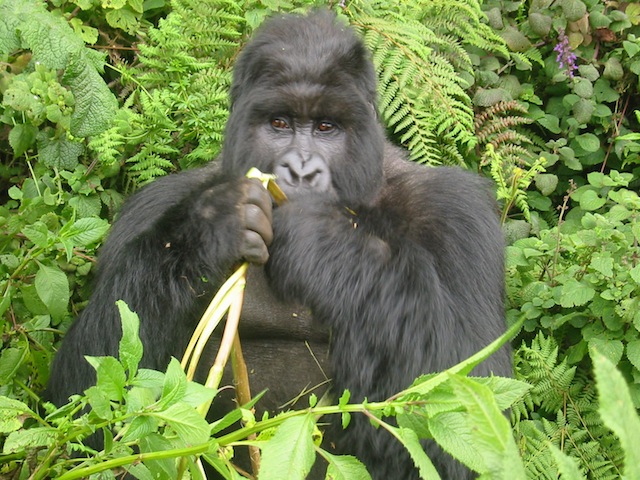
On some level, I respect vegans more than any other eating group on the planet. To say they have discipline is an understatement.
There’s no other group of individuals who can walk into a restaurant and be unable to eat anything on the menu.
When vegans make this choice for ethical reasons, I am in awe. Sacrificing such a big part of your lifestyle to save legally unprotected animals is truly noble… as long as you acknowledge it’s a sacrifice and not a health decision.
The problem comes when food myths (or flat out lies) get spread around in order to help the cause. These myths can sometimes even influence omnivore dieting because misinformation about nutrition never stays in one place.
So let’s address some of these…
The Top 4 Lies Vegans Tell You
#1 “There’s More Protein in <insert vegetable> than Meat.”
The first time I heard this one, I was shocked at both the statement and the person’s certainty of the statement. We were talking about nutrition and I mentioned that if I was a vegan, I’d be concerned about getting enough protein and looking into the best tasting vegan protein powder.
He responded, “There’s more protein in broccoli than steak. I bet you didn’t know that.”
Green vegetables generally have such a low-calorie count that, to be honest, I never really researched the exact numbers.
So later I looked it up… and for 2 cups of steamed broccoli we have:
Protein: 4.1 g
Carbs: 8.0g
Fat: 0.1g
To be honest, I am pretty impressed that there’s such a high percentage of protein (granted that carbs are almost double).
But still far less than steak. What did he mean?
If you go by weight, the protein count in a strip steak annihilates 8 oz (or even 32oz) of broccoli, so he couldn’t mean that.
By volume? Well comparing two cups of steak (100g+ protein) to two cups of broccoli (4.1g) isn’t a fair fight either.
I later found out he meant per calorie… which while being cleverly misleading is STILL WRONG. So there you have it.

#2 “You Can Get all the Protein You Need from Vegetable Products…”
Now this is half true so I shouldn’t come down too hard.
In terms of getting enough protein to survive… or possibly even to be healthy, yes you can eat enough beans, nuts, quinoa, and vegetables to get 50-60g per day.
Now whether the quality of the protein is good enough is another issue, but that’s a debate for another day.
I can certainly tell you that if you have any interest in aggressively pursuing muscle building goals, this opens up a very large can of worms because…
Your carb to protein ratios will NEVER catch up.
Remember our broccoli example?
I do actually think it’s cool you can get 4 grams of protein from a hunk of broccoli, just like I think it’s cool you get a free cup of coffee when you go to church (or just about place that meets in the morning).
That is… it’s a nice bonus, but you would never go to church as a source for coffee because there’s so much other stuff that comes with each cup. Starbucks would be a better bet for your caffeine needs.
To put this into practice, let’s say you managed to stomach 3 POUNDS of steamed spinach because you’re just gangsta like that. You enter the data in your food tracker and it’s…
46g protein… Yippee!! And…
75 grams of carbs??!?
You see where this is going now. No matter how much protein you manage to shove into your system via vegetables or grains, you’ll always end up with more carbs. The ratio never evens out.
The one exception is soybean, which has a measly 10-20% more protein than carbs. So even if you’re comfortable with the photo-estrogens feminizing your body, soy won’t save you.
#3 “You Get the Full Spectrum of Vitamins, Minerals, and Amino Acids from a Vegan Diet.”
For any well-informed vegan to state this, they would have to mumble “with supplementation” afterward.
The fact is that Vitamin B12 is impossible to get from an entirely natural plant-based diet. It’s not like protein where there’s enough to get by, and it’s not like iron where if you’re responsible enough you can keep yourself covered.
Vitamin B12 deficiency can actually make you go blind and this is why vegans have to get some other source of it, either via pills, injections or artificially fortified cereals. If this isn’t proof that humans are not meant to be vegan, I don’t know what is.
And Omega 3’s? That stuff you get from fish or organic beef is not going to be found in any significant amount from plants. Look at the vegan forums and they have tactics to supplement it.
#4 “That Gorilla is Pretty Buff and He’s Vegan”

This is one of the odder claims I’ve seen because it doesn’t even pretend to honor nutritional science.
Yes, gorillas eat a mostly vegan that comprise of a simple diet plan (bugs do creep into their plants so they’re not technically fully on the wagon).
I’m the first to admit I’m seethingly envious that a gorilla has no weight-training program and can eat leaves all day while being completely jacked by default with six pack abs.
However, you’d be an idiot to think that means you can do the same thing with the same results.
For whatever reasons, gorillas are wired differently… just like every non-human species in the world. If all you had to do was eat like a gorilla, then body-building amateurs would toss the steroids and HGH out and go straight to the jungle for a few months before competitions.
We have to accept that how other animals behave and grow is largely irrelevant to us until it’s tested on humans.
When someone figures out how to apply the gorilla diet to humans with the same results, believe me, you’ll see it posted here with pictures of me hanging from a tree.
Now, truth be told, there are a couple benefits to being a vegan. If you’re already obese, you will slim down extremely fast by switching to a plant-based diet, even if it’s simply from caloric deficit. And if your previous meat-based diet is cluttered with chicken nuggets and double-fried bacon, then of course switching to almonds and kale will be an improvement.
However, if all you seek is health and fitness, then the most balanced way to attain this is through an omnivorous diet.
Latest posts by Terry M (see all)
- Garage Gyms - Aug 1, 2018
- Kettlebells – Why They Should Be Added To Your Routine. - Jul 24, 2018
- Weight Belts: What Are They Really For? - May 31, 2018











Excellent article. To answer the gorilla question, gorillas have huge guts (see their pot bellies, that’s all intestines). In this gut they house specialized bacteria that turn what would normally be inedible leaves into essential fatty acids and protein. When scientists sampled what the gorillas were actually absorbing nutrient wise, it turns out their diet is rich in fat and protein. But we can’t turn leaves into essential fatty acids and protein, so any comparison is moot.
Hey Clay,
I appreciate the added information and appreciate you stopping by!
-Terry Asher